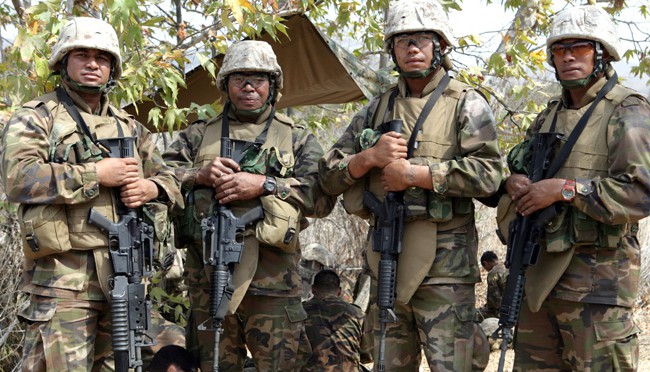
Fighting in whose name?
His Majesty’s Armed Forces (HMAF) has replaced Tonga Defence Services as the new name for the armed forces of Tonga. It took an act of Parliament in which the legislators voted 10-7 in favor of the new name. The Commander is the ‘Chief of Staff’, but in the Constitution, the King is the Commander-in-Chief.
But what’s in a name? Why is this change of name to Tonga’s armed forces so significant? A lot. Particularly in a fragile developing democracy only three years old.
Most of the people’s representatives in parliament were strongly opposed to the name change. Their central argument was that shifting the name from ‘Tonga Defense Services’ to ‘His Majesty’s Armed Forces’ symbolizes the disconnection of the armed forces to the people of Tonga. There has always been the fear among some that the armed forces would one day be used by the powers that be against the people. This fear is not far-fetched as this has happened in Tonga’s history in the 1850’s and after, when the tautahi (soldiers from the northern islands) under King George Topou I conquered Tongatapu and launched attacks at localities that were opposed to his rule. The armed forces were also used to carry out persecution on the Wesleyans who refused to join the king’s church.
Sione Taione, an outspoken people’s representative from Vaini district, told Parliament that the name change seems to indicate that the armed forces no longer belong to Tonga, but are now the Armed Forces of the king, much like the king’s personal militia. Dropping the word ‘Tonga’ was also argued to have signaled the loss of a sense of nationalism from the force. They no longer belong to the nation but to the king as his personal armed force.
Probably the most potent argument presented against the name change came from the two leaders of the pro-democracy movement, namely MP Dr Sitiveni Halapua and MP ‘Akilisi Pohiva. They argued that the new name was a setback for the democratisation reform process that began with the electoral reform of 2010. Dr Halapua reiterated the fact that in the ‘new democracy’ the government was no longer ‘His Majesty’s government’ as the king no longer appoints the prime minister and the ministers of the cabinet. In the new democratic reform structure, that authority has been given to parliament, which elects the prime minister, who in turn appoints the ministers of his cabinet.
Another alternative name proposal to the Tonga Defense Services was ‘Defense Services of the Kingdom of Tonga.’ Having the armed forces under the authority of the king as stated in the Constitution was not an issue, but that giving the name ‘His Majesty’s Armed Forces’ to the defense services and dropping the name Tonga from it seems to signal a stepping back from the democratisation process.
Before the democratic reform of 2010, the armed forces were called Tonga Defense Services. That name did not give any indication of the armed forces belonging to the king even though the monarch was Commander in Chief according to the Constitution. But now that Tonga is being democratised, a name is being used that seems to go against that process.
But those who favored the name change argued that the armed force was safer in the hands of the monarch so that the services could not be politicised by parliament. It was brought up in parliament also that the late King George Tupou V, architect of Tonga’s democratic reform, expressed wishes for the name change. Lord Ma’afu, Minister of Land, Surveys, and Natural Resources, himself a retired officer of the armed forces, said that monarchies like the British and Arab countries referred to their militaries as ‘His or Her Majesty’s army.’
Tonga’s armed force declared mission is to defend the sovereignty of the Kingdom of Tonga. The Tonga Defense Force (TDF) came into existence in 1939 at the beginning of World War II. In 1943, New Zealand helped train two Tongan contingents of about 2000 troops, who saw action in the Solomon Islands. At the end of World War II, the TDF was disbanded, but was activated in 1946 as the Tonga Defense Services.
Tonga and Fiji have the only military forces in the Southern Pacific states of Polynesia. Local critics of the Tonga armed force have raised questions over the past 20 years on why Tonga should have a military force. But arguments for a force seem to be more favoured among the people than arguments against it. Young people are finding that one of the best training opportunities they could receive in Tonga is from the armed forces; training in IT, in engineering and construction, in sailing, discipline, and leadership values are among those things highly valued. The TDS have provided the main services in emergency rescues and natural disasters in Tonga.
TDS have participated in peacekeeping operations in Bougainville from 1990 to 1995. In 2002, TDS soldiers were deployed with RAMSI in the Solomon Islands, followed by a contingent of 45 in 2004, and a third contingent in 2005.
In May of 2004, Tongan Marines were sent to Iraq for support services under the US led multinational force. In 2008, the Tongan troops ended their mission in the Iraq War and returned home. In 2010, Tongan troops began training with the RAF Regiment, in preparation for operations in Afghanistan, and the first troops were deployed in February 2011.
Tonga’s well-trained military is about 500 troops, half of which were sent to fight the War on Terror, either under US or British military supervision. But the armed forces have been deployed to deal with local riots as it happened in Nuku’alofa in 2006. And they have also been deployed as a naval patrol on occasion to deal with border violations as at the Minerva Reef, and with violations of Tonga’s restricted fishing zones.

